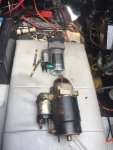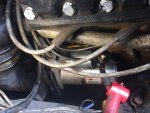- Joined
- Jul 18, 2011
- Messages
- 18,137
I reminded myself yesterday why I don't do compression tests on my twin engines, but every 2 years 
The engines are so close together that is makes the 'inside rows' of cylinders nearly impossible to reach. 4 hours to do both engines.
Anyway, here are the results of the one I did in 2018 and this year (2020), the engines have 1,030 hours on them. I also have a couple of questions for the group here . . .

.
It looks like cylinders 4 & 5 on both engines may have some valve leakage. I was going to do a cylinder leak test to verify, but I did not have the proper hose connections to do it (seems like I lost some stuff from my leak test kit :noidea: )
Anyway, the spec for the engines is 150 psi (red line) the test done in 2018 is in BLUE, this year is in GREEN.
A few questions . . .
1) I was thinking the engines may need a rebuild at some point, but it looks like they are hanging in there. Maybe just a valve job ??? The port engine is a bit higher on the compression . . . maybe by about 5 psi.
2) The spark plugs are 8 years old (ACDelco MR43T) . . . They look OK, but thinking it may be time to replace? (280 hours on the plugs) Are there better plugs to be running? Ignition is the HEI / EST type . . . Engine controller is the MEFI-1
3) During my winterization and testing over the past few days, the starboard engine would occasionally not want to crank (turn the key and nothing - no noise, nothing). I initially thought it was the solenoid, so I replaced it (Mercruiser OEM part). Same thing. Then I checked the voltage to the solenoid and it looked fine. After a while, it magically started working again . . . then the next day it would not work for a while . . . later on it started working again - all by itself Thoughts? :noidea: I am thinking a faulty ground connection, but no time to chase it.
Thoughts? :noidea: I am thinking a faulty ground connection, but no time to chase it.
BTW - 'we' often talk about engine cranking speed . . . It seems like the engines are cranking about 180-200 RPM during my compression test. (12 compression strokes in 8 seconds). I think this is about the normal cranking speed, but it is often discussed as needing to be 300 RPM, but not sure most V-8 engines actually reach that speed during cranking :noidea:
Also another thought - does having the outdrive attached during a compression test slow down the cranking speed much? I wonder if the 150 psi spec is without the outdrive, similar to a car being in neutral :noidea:
The engines are so close together that is makes the 'inside rows' of cylinders nearly impossible to reach. 4 hours to do both engines.
Anyway, here are the results of the one I did in 2018 and this year (2020), the engines have 1,030 hours on them. I also have a couple of questions for the group here . . .

.
It looks like cylinders 4 & 5 on both engines may have some valve leakage. I was going to do a cylinder leak test to verify, but I did not have the proper hose connections to do it (seems like I lost some stuff from my leak test kit :noidea: )
Anyway, the spec for the engines is 150 psi (red line) the test done in 2018 is in BLUE, this year is in GREEN.
A few questions . . .
1) I was thinking the engines may need a rebuild at some point, but it looks like they are hanging in there. Maybe just a valve job ??? The port engine is a bit higher on the compression . . . maybe by about 5 psi.
2) The spark plugs are 8 years old (ACDelco MR43T) . . . They look OK, but thinking it may be time to replace? (280 hours on the plugs) Are there better plugs to be running? Ignition is the HEI / EST type . . . Engine controller is the MEFI-1
3) During my winterization and testing over the past few days, the starboard engine would occasionally not want to crank (turn the key and nothing - no noise, nothing). I initially thought it was the solenoid, so I replaced it (Mercruiser OEM part). Same thing. Then I checked the voltage to the solenoid and it looked fine. After a while, it magically started working again . . . then the next day it would not work for a while . . . later on it started working again - all by itself
BTW - 'we' often talk about engine cranking speed . . . It seems like the engines are cranking about 180-200 RPM during my compression test. (12 compression strokes in 8 seconds). I think this is about the normal cranking speed, but it is often discussed as needing to be 300 RPM, but not sure most V-8 engines actually reach that speed during cranking :noidea:
Also another thought - does having the outdrive attached during a compression test slow down the cranking speed much? I wonder if the 150 psi spec is without the outdrive, similar to a car being in neutral :noidea:
Last edited:























